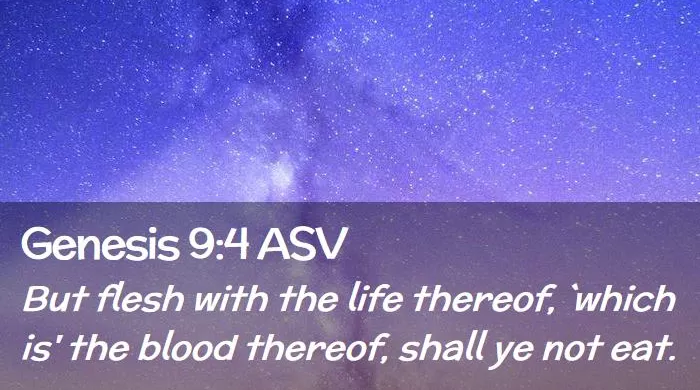Read the Daily Bible Verse Genesis 9:4 To Strengthen Your Spiritual Journey.
“But flesh with the life thereof, which is the blood thereof, shall ye not eat.” (Genesis 9:4 KJV)
Genesis 9:4 is a verse rich with historical and theological significance, emerging from the broader narrative of God‘s covenant with Noah and his descendants following the Flood. This passage, while succinct, holds profound implications for understanding the relationship between humanity, God, and the sanctity of life.
Genesis 9:4 KJV Background
Genesis 9:4 is set in the aftermath of the great Flood, where Noah and his family are presented as the new beginning for humankind. This verse is part of the covenant God makes with Noah, which establishes fundamental principles for human conduct. The context of Genesis 9:4 is critical: it follows God’s blessing upon Noah and the promise that never again would a flood destroy the earth. God’s instructions here are meant to guide Noah and his descendants in their new world, outlining how they should approach their stewardship of life and creation.
Genesis 9:4 Meaning
The command in Genesis 9:4 is a prohibition against consuming blood, which is described as containing the “life” of the flesh. This directive emphasizes the sanctity of life and the importance of respecting it. In ancient Near Eastern cultures, blood was often associated with life and vitality, making it a symbol of sacredness. By forbidding its consumption, God underscores that life is sacred and should not be desecrated. This command sets a foundational principle for human ethics, highlighting the reverence and care that should be afforded to all living things.
Genesis 9:4 Application in Life
Applying Genesis 9:4 today involves recognizing the sanctity of life and making ethical choices that reflect respect for it. For Christians, this command reinforces the value of life and the importance of humane treatment of animals. It also encourages a broader ethical stance on how we live and interact with the world, suggesting that our actions should honor the divine creation and its inherent value. Modern practices in food consumption, animal welfare, and environmental stewardship can be seen as extensions of this principle.
See also: What Does Genesis 9:3 Mean?
Comparison with Other Biblical Texts
Genesis 9:4 can be compared with other biblical texts that address the sanctity of life and ethical behavior. For example, Leviticus 17:10-14 reiterates the prohibition against consuming blood, further elaborating on its significance. In the New Testament, Acts 15:20 and Acts 15:29 reflect a similar concern for prohibiting the consumption of blood among Gentile believers, emphasizing continuity in the ethical teachings regarding life. These texts collectively underline the persistent theme of respecting and valuing life throughout the Bible.
Modern Relevance
In the contemporary world, Genesis 9:4’s principles can be applied to various issues such as ethical treatment of animals, environmental conservation, and humane food practices. The growing movement towards sustainable and ethical consumption reflects an awareness of the principles enshrined in this verse. Additionally, this command can inspire discussions on bioethics, particularly in areas involving genetic modification and animal testing, where respect for life remains a core consideration.
Conclusion
Genesis 9:4, while a brief directive, offers profound insights into the nature of life and humanity’s responsibility towards it. By forbidding the consumption of blood, God imparts a fundamental respect for life that transcends ancient customs and continues to hold relevance today. This verse encourages believers to reflect on how they honor the sanctity of life in their everyday actions, promoting a broader ethic of respect and stewardship in both personal and communal spheres.
Genesis 9:4 Commentary
Commentaries on Genesis 9:4 often emphasize its role within the broader context of the Noahic covenant, highlighting its function as a moral and ethical guideline for humanity. Scholars note that the prohibition against consuming blood serves as a reminder of life’s sanctity and the importance of living in accordance with divine principles. This command not only established a foundational ethical norm but also underscored the reverence due to God’s creation, a theme that resonates throughout biblical teaching and Christian ethics.


